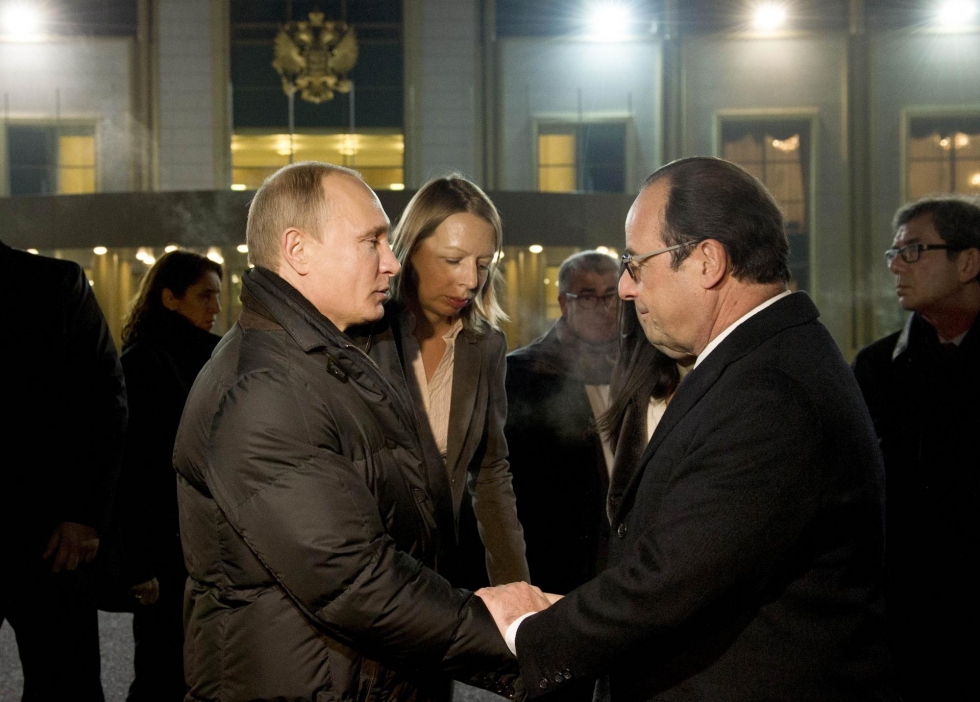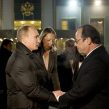
Moscow Hopes Hollande May Replace Unfriendly Merkel as Russia’s Main Interlocutor
Publication: Eurasia Daily Monitor Volume: 11 Issue: 221
By:

In the spacious, though somewhat faded and dimly lit lavishness of the Soviet-built official air terminal of Vnukovo-2, on the afternoon of December 6, President Vladimir Putin met for two hours with his French counterpart, Francois Hollande. This previously unannounced meeting was, according to the Kremlin, tentatively proposed during the G20 summit in Brisbane last month and organized with the help of Kazakhstani authorities. Hollande was returning to Paris after a visit to Kazakhstan and landed in Vnukovo (Moscow) for an improvised summit to discuss the Ukrainian crisis and other pressing world issues like Syria and the Iranian nuclear problem. According to Putin’s foreign policy aide Yuri Ushakov, “The talks were constructive and some understanding was achieved on the need to fully implement the Minsk ceasefire agreements,” signed in the Belarusian capital last September by the eastern Ukrainian separatist rebels, Kyiv authorities, representatives of Russia and the Organization for Security and Cooperation in Europe (OSCE) (Interfax. December 8).
The Russian president told journalists after the Vnukovo summit: “We both agreed that the Minsk ceasefire agreements must be fully implemented.” Putin declared that Russia “upholds the territorial integrity of Ukraine [without Crimea]” and wants to see a steady ceasefire in the Donbas region (area of eastern Ukraine encompassing the Luhansk and Donetsk provinces), the establishment of a clear line of control between the rebels and Ukrainian government forces, a withdrawal of heavy weapons by both sides from the line of control, as well as the resumption of trade and banking operations between the rebel-held areas and the rest of Ukraine. Putin acknowledged that both sides of the conflict “are not fully implementing the Minsk agreements,” which must be honored “to find a lasting political solution” (Kremlin.ru, December 6).
The problem of the two Mistral-class helicopter-carrying assault vessels, according to Putin, was not discussed with Hollande in Vnukovo. Russia has ordered the ships from France in 2011. The first—the Vladivostok—has been completed and is ready for delivery, but Hollande has not allowed it sail to St. Petersburg with its Russian crew, because of the Russian involvement in the Ukrainian crisis. Putin told reporters Russia is ready to wait for the Vladivostok’s delivery. And if France finally decides otherwise and impounds the ships, he expects to be refunded for money spent on the Mistral contract (Kremlin.ru, December 6).
Moscow had previously mostly relied on Germany—Russia’s main trading partner within the European Union—to be its chief interlocutor in the West. But Chancellor Angela Merkel turned out to be a serious disappointment; she has been strongly and vocally opposed to Putin’s Ukrainian policies and the annexation of Crimea. The meeting with Hollande in Vnukovo raised great hopes in Moscow that the unity of Western powers in opposing Russian actions in Ukraine is beginning to wane and that the sanction regime, which is harming the already wobbly Russian economy, will begin to fall apart. The Moscow press emphasized that Hollande is the first Western leader to visit Russia after the Ukrainian crisis erupted. And France may replace Germany as Russia’s primary Western friend. Hollande, reportedly, assured Putin that Ukraine will not be allowed to join the North Atlantic Treaty Organization (NATO), and Crimea may be tacitly recognized as a de facto Russian possession. In return, Hollande was seeking a definite de-escalation of the armed confrontation in the Donbas region and serious steps (not just “signals”) on the way toward the full implementation of the Minsk ceasefire agreements. (Nezavisimaya Gazeta, December 8).
The armed confrontation in Donbas, which began as a Russian-sponsored separatist rebellion last April, has by the year’s end developed into a hopeless bloody stalemate. Putin seems truly in favor of a steadier ceasefire in Donbas and a resumption of financial/economic ties between Donbas and Kyiv, which could relieve Moscow from being the sole financial/economic supporter of the rebel-held territory. Putin may want Ukraine to keep a semblance of “territorial integrity” (without Crimea), if this could encourage an easing of Western sanctions. But at the same time, he probably wants to keep Ukraine as a loose federation, which could prevent it from integrating with European and transatlantic institution. The coming cold winter of deprivation, fanatical bankruptcy, economic collapse and political instability in post-revolutionary Ukraine could undermine its present Western-orientated government, fulfilling the Kremlin’s strategic bidding without the need to commit to risky and costly military action.
A more solid ceasefire in Donbas seems to now be in everybody’s interest. This week, Ukrainian President Petro Poroshenko ordered his forces to observe a strict ceasefire, beginning December 9, and it seems to be partially holding (Interfax, December 9). The rebels say they have been holding back fire “inasmuch as the other side is complying.” The rebels have announced a partial withdrawal of heavy guns from the line of control “in the south of the front line.” A Ukrainian ministry spokesman told journalists there is little evidence of any weapons being withdrawn and that outbreaks of shelling continue (Interfax, December 11). A full ceasefire would be extremely hard to implement in Donbas. Moscow will surely not hand over full control of the border between Russia and the separatist enclave back to Kyiv or to OSCE observers or disarm the rebels. Putin may agree that further military escalation is, at present, undesirable. But a collapse of the pro-Russian rebellion in Donbas will not be allowed.
Moscow wants Hollande to deliver the Vladivostok helicopter carrier, and many in the French elite want the same. The Vladivostok delivery has military significance, but mainly it is important politically for the Kremlin as signifying a public breach of Western unity (Kommersant, December 8). In return, however, Moscow is not ready to fully implement all aspects of the de-escalation measures as envisaged in the Minsk protocols or to pressure the rebels into holding local elections under Ukrainian law. If Hollande is ready to settle for a continuation of the wobbly ceasefire in Donbas and recognizes Putin’s declared intent to “uphold the territorial integrity of Ukraine [without Crimea]” as “significant progress,” he may deliver the Vladivostok. If not, the high hopes of the sanction regime against Russia unraveling, which Hollande’s surprise visit has sparked in Moscow, will fade.




